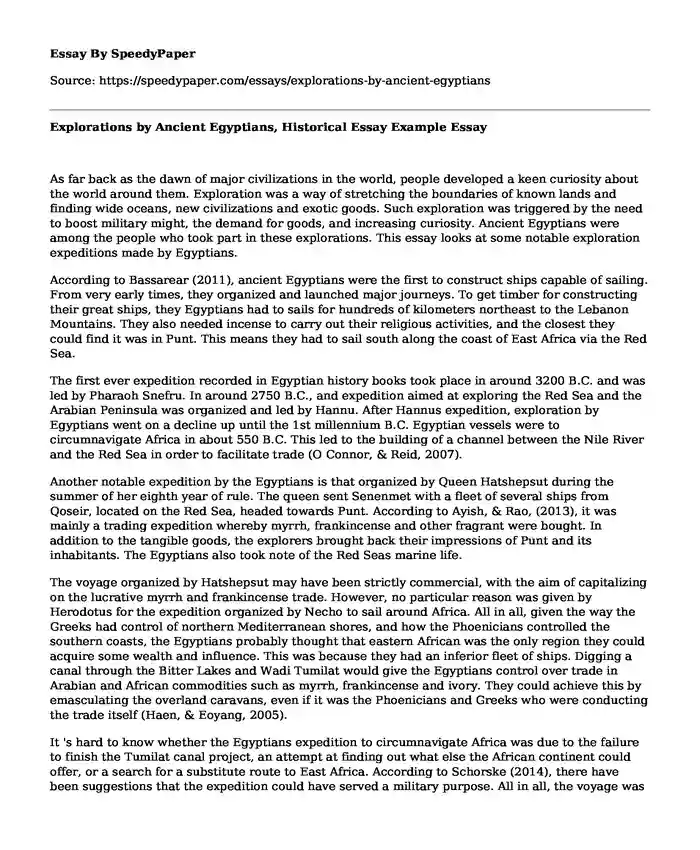
| Type of paper: | Essay |
| Categories: | History Anthropology |
| Pages: | 3 |
| Wordcount: | 662 words |
As far back as the dawn of major civilizations in the world, people developed a keen curiosity about the world around them. Exploration was a way of stretching the boundaries of known lands and finding wide oceans, new civilizations and exotic goods. Such exploration was triggered by the need to boost military might, the demand for goods, and increasing curiosity. Ancient Egyptians were among the people who took part in these explorations. This essay looks at some notable exploration expeditions made by Egyptians.
According to Bassarear (2011), ancient Egyptians were the first to construct ships capable of sailing. From very early times, they organized and launched major journeys. To get timber for constructing their great ships, they Egyptians had to sails for hundreds of kilometers northeast to the Lebanon Mountains. They also needed incense to carry out their religious activities, and the closest they could find it was in Punt. This means they had to sail south along the coast of East Africa via the Red Sea.
The first ever expedition recorded in Egyptian history books took place in around 3200 B.C. and was led by Pharaoh Snefru. In around 2750 B.C., and expedition aimed at exploring the Red Sea and the Arabian Peninsula was organized and led by Hannu. After Hannus expedition, exploration by Egyptians went on a decline up until the 1st millennium B.C. Egyptian vessels were to circumnavigate Africa in about 550 B.C. This led to the building of a channel between the Nile River and the Red Sea in order to facilitate trade (O Connor, & Reid, 2007).
Another notable expedition by the Egyptians is that organized by Queen Hatshepsut during the summer of her eighth year of rule. The queen sent Senenmet with a fleet of several ships from Qoseir, located on the Red Sea, headed towards Punt. According to Ayish, & Rao, (2013), it was mainly a trading expedition whereby myrrh, frankincense and other fragrant were bought. In addition to the tangible goods, the explorers brought back their impressions of Punt and its inhabitants. The Egyptians also took note of the Red Seas marine life.
The voyage organized by Hatshepsut may have been strictly commercial, with the aim of capitalizing on the lucrative myrrh and frankincense trade. However, no particular reason was given by Herodotus for the expedition organized by Necho to sail around Africa. All in all, given the way the Greeks had control of northern Mediterranean shores, and how the Phoenicians controlled the southern coasts, the Egyptians probably thought that eastern African was the only region they could acquire some wealth and influence. This was because they had an inferior fleet of ships. Digging a canal through the Bitter Lakes and Wadi Tumilat would give the Egyptians control over trade in Arabian and African commodities such as myrrh, frankincense and ivory. They could achieve this by emasculating the overland caravans, even if it was the Phoenicians and Greeks who were conducting the trade itself (Haen, & Eoyang, 2005).
It 's hard to know whether the Egyptians expedition to circumnavigate Africa was due to the failure to finish the Tumilat canal project, an attempt at finding out what else the African continent could offer, or a search for a substitute route to East Africa. According to Schorske (2014), there have been suggestions that the expedition could have served a military purpose. All in all, the voyage was consistent with Necho foreign policy as he sought to benefit Egypt economically by improving sea routes access. Necho is credited with pioneering the construction of a canal connecting the Red Sea with the Nile Valley.
References
Ayish, M. & Rao, S. (2013). Explorations in Global Media Ethics. London, UK: Routledge.
Bassarear, T. (2011). Explorations. Boston, MA: Cengage Learning.
Haen, T. & Eoyang, E.C. (2005). Intercultural Explorations. New York, NY: Rodopi.
O Connor, D. & Reid, A. (2007). Ancient Egypt in Africa. Walnut Creek, CA: Left Coast Press.
Schorske, C.E. (2014). Thinking with History: Explorations in the Passage to Modernism. Princeton, NJ: Princeton University Press.
Cite this page
Explorations by Ancient Egyptians, Historical Essay Example. (2019, Jul 15). Retrieved from https://speedypaper.net/essays/explorations-by-ancient-egyptians
Request Removal
If you are the original author of this essay and no longer wish to have it published on the SpeedyPaper website, please click below to request its removal:
- Eating Disorder Essay Sample: The Thin Film Analysis
- What Is Nature and Nurture, Essay Sample
- Free Essay with the Sleepy Hollow Movie Review
- Review of Motivating Employees. HR Essay Example.
- The Bike Riding Startup - Business Plan Essay Sample
- Feminism Theory in Analysis of Poems
- Problems of Four-Day School Week, Free Essay in Education
Popular categories




